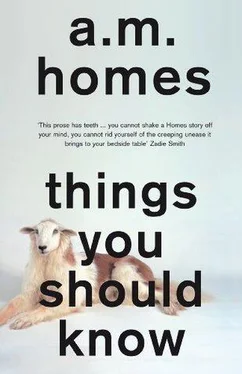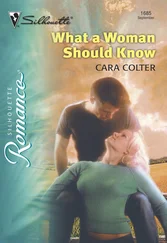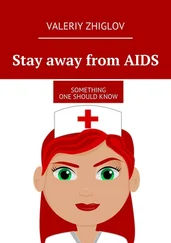She gets out of the car.
“Remember when I was little,” she calls down the hill. “And we used to rake together. You had the big one and I had the small bamboo…”
He turns. A terrifying sensation sweeps through her. It’s Ray.
“I want you out,” she says, shocked. “Now!” He intentionally misled her. He had to have known what she was thinking when she drove in, when she beeped and waved, when she said, remember when I was little. Why didn’t he take off the hat, turn around, and say, I am not who you think I am?
“Where is my father? What have you done to my father? Those are not your clothes.”
“Your father gave them to me.”
She moves toward him.
Ray is standing there, her father’s cap still on his head. She reaches out, she knocks it off. He bends to pick it up.
“It’s not your hat,” she says, grabbing it, throwing it like a Frisbee across the yard. “You can’t just step inside someone’s life and pretend you’re them.”
“I was invited.”
“Get your stuff and get out.”
“I’m not sure it’s entirely up to you,” Ray says. This is as close as he comes to protesting. “It’s not your house.”
“Oh, but it is,” she says. “It’s my house and it’s my family and I have to have some influence on what happens here. They’re old, Ray. Pick on someone else.” She grabs the rake and uses it to shoo him inside. “It’s over. Pack your bags.”
Her mother comes home just as Ray is trying to put the cat into his travel case. The cat is screaming, howling. The cab is waiting outside.
“What’s going on? Did something happen to the cat? Does he need me to take him to the vet?”
“He can’t stay,” she says. “He was in the yard acting like Daddy, he was wearing Daddy’s clothes. He can’t do that.”
“He’s your father’s friend. We like having him here.”
“He can’t stay,” she repeats.
“Maybe you shouldn’t have come home,” her mother says. “Maybe it’s too hard. You know what they say.”
“I’m just visiting,” she says.
Ray comes up the stairs. He has a single suitcase, the cat carrier, and a brown paper bag filled with his supplements, his wheat germ, and the red and the green stuff.
“It doesn’t have to be this way,” her mother says.
“It does,” she says.
“Good-bye,” Ray says, shaking her mother’s hand.
There’s something about his shaking her mother’s hand that’s more upsetting than anything, it’s heartbreaking and pathetic, it’s more and less affecting than a clinging hug.
“Don’t forget us, Ray,” her mother says, walking him to the door, letting him out almost as easily as they let him in. “I’m so sorry, I apologize for the confusion.”
And then he is gone. She goes down to his room. She checks the doors. He has left his key on the bed along with her father’s clothes, neatly folded, his bedding all rolled up.
She comes back upstairs.
“Now what, Mrs. Big Shot?” her mother says. “Now who’s going to take care of us?”
“I don’t know.”
“Your father didn’t even have a chance to say good-bye.”
“I’m not saying they can’t be friends — I’m sure he’ll see him at the next vitamin meeting — just that Ray can’t live here. This isn’t a commune.”
She is sitting in the den. Her mother is knitting.
Her father comes home. “I made a nice drawing today,” her father says.
“That’s nice,” her mother says.
“Were there any messages?”
“No,” her mother says.
They sit in silence for a few minutes longer.
“Where’s Ray?”
“She made him leave,” her mother says, gesturing toward her with a knitting needle.
“He was in the yard, raking. He had your clothes on. I thought he was you — he scared me.”
“He did a good job,” her father says. “The yard looks good.”
Again there is silence.
“Where’d he go?” her father asks.
“I have no idea, it all happened so quickly. Maybe back to the vitamin store,” her mother says.
She feels as though she can’t stay. She has shaken things up too much, she is really on the outside now.
“I guess I should go,” she says.
Later that night she will take the train back to New York. The apartment will be empty. There will be a note from Steve. “I thought I should go. If you need me I’m at Bill’s. Hope you had a good weekend.”
“You come home, upset everything, and then you just leave?” her mother says. “What’s the point of that?”
“I wanted to talk to you,” she says.
“So talk,” her mother says.
We were the boys of summer vacation, Henry Heffilfinger and me. It was my fifth summer at my father’s house, six years after my parents divorced, three years after my mother remarried, the summer of ’79, the summer I was twelve, the summer the world almost stopped spinning round.
Henry’s mother picked me up at the airport. “Hello! Hello!” she called from the far end of the terminal, waving her arms through air, as if simultaneously fanning herself and guiding me in for landing.
“Oh, you look tall,” she said, trying to wrestle away my carry-on bag. “Your father was busy; he asked me to come. So, that’s why I’m here.” She stopped for a minute, combed the hair out of my face with her fingernails. “We’re so glad you’ve arrived; we’re going to have a fine summer.”
For that moment, while her pink frosted nails were tickling my skull, I believed her.
Luggage spun on a wide stainless-steel rack; suitcases slid up, down, sideways, crashing into each other with the painless thud of bumper cars. We stood watching until everything had come and gone, until there was nothing left except a couple of old bags that probably belonged to someone who’d died in a plane crash, who’d left their luggage forever going round and round.
“Where’s Henry?” I asked.
Maybe Henry was my hero, maybe just my friend, I don’t know. He had a mother, a father, and a little sister, all together, on one street, in one city. He had no secrets.
“Guarding the car. I’m parked in a terrible place.”
While I stood by the carousel, hoping my suitcases would home in and find me, Mrs. Henry took my luggage checks and went off in search of information.
If you’re wondering what the point is calling Henry by his own name and then calling his mother Mrs. Henry, well what can I say, all the Heffilfingers were Henrys to me. Mr., Mrs., baby June, and Henry himself.
I rolled my eyes in a full circle counting the brown-and-yellow spots that made up the tortoiseshell rims of my glasses. They were new glasses, my first glasses. No one in Philly had seen them yet except Mrs. Henry, and she was sharp enough not to say anything.
A couple of months ago my school borrowed vision machines from the motor vehicle department and lined us all up. I looked into the viewfinder and said to the school nurse, “I can’t see anything, it’s pure blackness.”
“Press your head to the bar, wise guy,” she said.
I pressed my forehead against the machine and the screen lit up, but all that light still didn’t do much good. The nurse sent me home with a note for my mother who simply said, “You’re not getting contacts; you’re too young and too irresponsible.”
I thought of not taking the glasses to Philly, of going through one more blind, blurry summer, but the fact was they made a real difference, so I wore them, and kept the unbreakable case and a thousand specially treated cleaning sheets jammed into my carry-on bag.
Four-eyed, but alone in the Philadelphia airport, I may as well have been a boy without a brain. Like a sugar doughnut, I was glazed. Stiff.
Читать дальше












